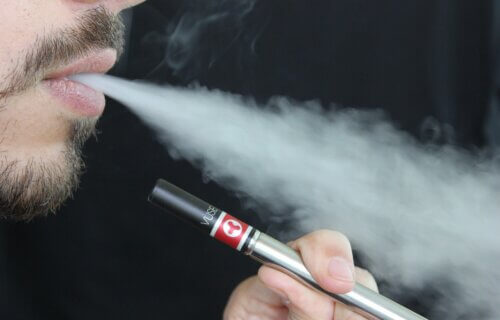As I was combing through the latest medical news, I stumbled over an article entitled Is Vaping Bad for You? That question should have become rhetorical years ago. Until it is, the medical community and the media have some educating to do in the interest of public health, especially the well-being of our youth. The health-robbing effects of vaping should be as well-known as the dire consequences of cigarette smoking.
Specifically, vaping is the use of electronic devices to heat a liquid (“e-juice” or “e-liquid”), creating an aerosol which users inhale. Most of the devices look like battery-powered cigarettes, pens, or USB flash drives. Despite more and more studies warning against the use of these devices, there is still a narrative that e-cigs and vaping are somehow “healthier” and a viable alternative to smoking tobacco products.
Since there’s confusion surrounding the topic of vaping, let’s take a look at some of the factual and fictional information out there regarding these products.
1.Vaping devices are classified as tobacco products by the U.S. Food and Drug Administration (FDA).
Fact. Almost all e-juices contain nicotine – up to 99 percent, according to the Centers for Disease Control and Prevention (CDC). E-cigarettes usually contain flavorings and numerous other chemicals as well. Some devices are used to dispense marijuana.
2. Vaping is less addicting than smoking cigarettes.
Fiction. Nicotine is highly addictive in whatever form it is ingested. After becoming physically dependent on it, you could experience symptoms of nicotine withdrawal. These may include:
- Intense cravings
- Anxiety
- Depression
- Restlessness
- Insomnia
- Difficulty concentrating
- Irritability
Research suggests that vaping can increase the risk of developing other addictions, which is especially true for teens and young adults.

3. Vaping, when substituted for smoking cigarettes, is an effective, safe step in weaning off all nicotine-containing products.
Fiction. Like smoking cigarettes, vaping usually involves inhaling nicotine and a smorgasbord of other chemicals. Many people believe that vaping is a safer alternative to smoking because vaping generates far fewer toxic chemicals than the mix of 7,000 harmful substances in cigarettes. E-cigarette aerosols, however, are often permeated with metals like lead, toxic organic compounds, and cancer-causing chemicals. Between vaping and smoking it’s a case of “pick your poisons.” There are no winners.
Among teens, vaping is more popular than smoking. Teens buy into the incorrect narrative that vaping is safer than smoking. Vaping is also easier to hide from parents and caregivers because it doesn’t have the intense odor of cigarette smoking.
Some people who vape also smoke cigarettes. It’s called “dual use,” and it increases risk for heart disease and many other adverse health concerns.
Research is unclear about the value of vaping to quit smoking. The FDA has not approved vaping for use as a tool to quit smoking.
4. Vaping is associated with suicidal thoughts.
Fact. Studies suggest that vaping may contribute to a greater likelihood of developing mental health symptoms and disorders. These include:
- Depression
- Mood disorders
- Anxiety
- Suicidal ideation
The brains of adolescents and young adults are being formed until their mid-twenties, making this group’s mental health especially vulnerable to adverse effects of vaping and smoking. Unfortunately, there is little research in this area. Scientists explain that it is unethical, in the interests of gaining new knowledge, to expose people to substances known to have significant toxic effects.
5. Vaping can adversely affect fertility.
Fact. There are several issues of sexual and reproductive dysfunction associated with vaping. These include erectile dysfunction, low sperm count in young men, and altered levels of some hormones associated with reproduction.

6. There is less risk of developing chronic obstructive pulmonary disease (COPD) with vaping than with cigarette smoking.
Fiction. There are numerous respiratory illnesses associated with vaping. These include emphysema, chronic obstructive pulmonary disease (COPD), pneumonia, chronic bronchitis, and asthma. The disease-causing process is the inhalation of fine particles throughout lung tissue. These diseases are potentially fatal.
According to the CDC and the American Lung Association, there is a growing number of lung diseases associated with vaping. There is belief among scientists that these diseases are caused by additives to e-liquids, such as vitamin E acetate.
7. The COVID-19 pandemic coincided with an increase in daily use among people who used vaping devices.
Fact. When the coronavirus pandemic began, data showed that e-cigarette sales decreased. There was speculation that the decrease could be attributed to people spending more time at home, avoiding stores and public places. Among those who were already vape users, however, the rate of daily use increased. It raises a concern that more people have developed nicotine addiction.
8. Vaping may increase your risk for contracting coronavirus disease.
Fact. One study of more than 4,300 young adults found that those who vaped regularly were five to seven times more likely to test positive for the coronavirus.
How do you quit vaping?
Quitting vaping can be difficult, but you can increase your chance of quitting if you plan for your success:
- Why are you quitting? What will life be like vape-free?
- Choose a quit date and let others know your date.
- Write out your plan. How are you going to manage cravings and avoid triggers? What will keep you motivated?
- Build a support team that can help you through rough patches. Your team can include friends, family, peers, clergy, coaches, counselors, and medical professionals.
- You can call 1-800-QUIT-NOW, 1-877-44U-QUIT, or the National Cancer Institute’s LiveHelp service, for support.


It’s strange to see such misinformation from a Doctor. I don’t vape and I don’t sell them, but I am aware that the Cochrane Review is the gold standard for medical research and has found that vaping is an effective form of smoking cessation.
Millions of people vaping for 15 years. Millions of ex-smokers who have improved their health by vaping. Zero evidence of any of the harms listed in this article appearing in real life.
This is the scientific equivalent of being anti-vax.
Wow. I have to wonder sometimes whether the muddling of theses like we see here is intentional. She sets out at first to show that vaping is bad. That’s an easy task, and it is what she spends the article arguing.
But at the end of the second paragraph, she seems to expand the thesis to assert that vaping is no better than smoking cigarettes. She offers zero evidence to support this argument, but an inattentive reader might not notice that.
Shame on doctors who do not embrace the harm reduction that vaping represents. There are, no doubt, people dying of lung cancer every day because they were led to believe that vaping is no better than smoking cigarettes.
I can only wonder who is paying this doctor to risk her medical license by putting her name over this thourghky debunked crap. Almost nothing that she writes, or cut and pasted, is supported by peer reviewed studies, quite the opposite. What horse manure.